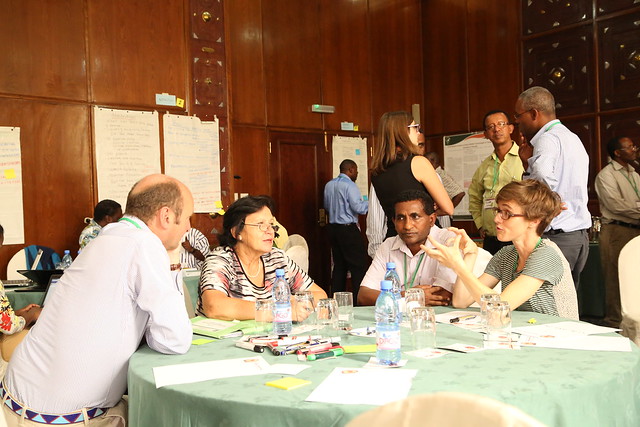Africa RISING gears up for phase two

October 2015 marks a critical moment for the International Institute of Tropical Agriculture (IITA)-led Africa RISING projects in East/Southern Africa, West Africa and the Ethiopian highlands. It is the beginning of the final year of the first phase of the three United States Agency for International Development (USAID)-funded projects after four years of action research in five countries.
In preparation for the second phase, project partners from eight CGIAR centres, national research systems and other international research centres recently held a meeting (6-8 October) in Bamako, Mali, to write up the components for the second phase proposal.
Participants at the meeting developed write-ups on various components for the Phase 2 proposal including systems approach, research questions, program theory of change and impact pathways, vision of success, communication approach, data management, stakeholder engagement, gender strategy, monitoring and evaluation as well as the scaling approaches to be used. Importantly, the team also agreed on the activities and milestones still to be achieved until the final proposal is submitted to USAID in June 2016.
‘This is the perfect time to stand still, look back, and plan on the way forward. Africa RISING is recognized within the CGIAR as a systems research program and there is renewed motivation to advance systems research which we believe offers an opportunity to address the challenges faced by smallholder farmers,’ noted Bernard Vanlauwe, IITA director for central Africa Hub and outgoing chair of the Africa RISING program coordination team (PCT).
Also speaking during the meeting was the current Africa RISING PCT chair, Siboniso Moyo of ILRI who noted that a lot of technologies had been developed for smallholder farmers during Phase 1 of the program and it was therefore of utmost importance to ensure that they are successfully scaled-up for adoption by smallholder farmers in the project countries in the second phase of the program.
While several cost-benefit analyses for various technologies developed in the program have been conducted or are being conducted, partners taking part in the meeting also agreed that in addition to economic factors, other sustainable intensification indicators will also be used to evaluate their scalability. Africa RISING will pioneer this aspect with a set of sustainable intensification indicators for evaluating technologies. It was agreed that the program’s core business remains research which will be complemented by scaling through successful partnerships with development projects funded through in-country USAID missions and other development actors.
‘We have had a lot of success in showing the high level of research outputs from Africa RISING within USAID, including showing our good results to missions in Zambia, Mali, and Tanzania. We need to keep working at it to sustain the interest,’ said Jerry Glover of USAID.
‘The program is well positioned to do an even much better job in meeting the Feed the Future goals in the second phase. We will work with development partners funded by USAID country missions like the NAFAKA in Tanzania,’ added Irmgard Hoeschle-Zeledon, Africa RISING West Africa and East/Southern Africa coordinator.
A writing team of four scientists has now been charged with putting the write-ups generated from the meeting into a complete proposal.





Latest Comments